- Home
- Jack Gantos
Jack on the Tracks
Jack on the Tracks Read online
BY JACK GANTOS
Desire Lines
Joey Pigza Swallowed the Key
The Jack Henry Books
Jack on the Tracks: Four Seasons of Fifth Grade
Heads or Tails: Stories from the Sixth Grade
Jack’s New Power: Stories from a Caribbean Year
Jack’s Black Book
J A C K G A N T O S
Jack
on the
Tracks
Four Seasons of Fifth Grade
FARRAR, STRAUS AND GIROUX NEW YORK
Copyright © 1999 by Jack Gantos
All rights reserved
Distributed in Canada by Douglas & McIntyre Ltd.
Printed in the United States of America
Designed by Rebecca A. Smith
First edition, 1999
9 11 12 10 8
Library of Congress Cataloging-in-Publication Data Gantos, Jack.
Jack on the tracks: four seasons of fifth grade/Jack Gantos. - 1st ed.
p. cm.
Summary: Moving with his unbearable sister to Miami, Florida, Jack tries to break some of his bad habits but finds himself irresistibly drawn to things disgusting, gross, and weird.
ISBN 0-374-33665-2 ISBN 978-0-374-33665-3
[1. Brothers and sisters—Fiction. 2. Self—perception—Fiction. 3. Moving, Household—Fiction. 4. Miami (Fla.)—Fiction. 5. Humorous stories.] I. Title.
PZ7.G15334Jac 1999
[Fic]—dc21 99-27897
For Anne and Mabel
Contents
Riding Shotgun
Belling the Cat
The Sixth Sense
The Penny Tree
From the Grave
Bottom Line
Crybaby
Adults Only
Beauty and Order
Riding Shotgun
It was dark. Dad was driving and I was riding shotgun.
We had been heading toward Miami from the moment he locked the front door of our rental house in Cape Hatteras, twisted the brass key off his key ring, stooped down, and slid it back under the door. “That’s that,” he declared, rubbing his hands together. As he stepped away the screened door banged back against the jamb like a starter’s pistol. Dad smiled broadly, then reached into his rear pocket and removed his handkerchief. He flicked it open and waved it above his head.
“Gentlemen,” he announced, as if we were at the Indy 500, “start your engines.”
A minute later I had a gas-station road map unfolded over my lap and we were crossing the outer-islands bridge, leaving Cape Hatteras behind. I took a deep breath of summer sea air and wondered if the ocean in Miami would have the same sour crab-shell smell as the ocean in North Carolina. I hoped so. When I woke up in the middle of the night the smell of the ocean always made me imagine our house was afloat and lost at sea. In the morning I was always a little disappointed that we hadn’t been washed away like the Swiss Family Robinson.
Mom and Betsy and Pete had flown ahead. They were cleaning up our next rental while staying at a motel. Dad and I had loaded up the U-Haul truck during the day and planned to meet them as fast as we could make it down.
“You know, Dad,” I said once we left North Carolina and entered South Carolina, “I’ve been thinking. I have a feeling that I left the water running in the bathroom.”
“I’m sure you didn’t,” he said. “Don’t worry about it.”
“And”—I hesitated—”I think I may have left the gas burner on in the kitchen.”
“I don’t think so,” he replied, as a line of cars passed us. “I would have smelled it.”
“And I think I left my backpack in—”
Dad had heard enough. He jerked his eyes away from the windshield and stared at me for so long we drifted across the white lines into the next lane. “Let me set you straight on the definition of thinking” he said, carefully pronouncing every word as if they were to be carved in stone. He wasn’t in a good mood to begin with. We had the most powerless U-Haul truck ever built. Each time we climbed a hill we slowed down so much he had to drive in the break-down lane so every car on the east coast could get around us. “Thinking,” Dad continued, glancing at the road and making an adjustment so we wouldn’t cause a pileup, “is when you actually think of something you remember doing. Like, if you remember leaving the spigot running in the bathroom—if you actually picture doing it in your mind—then that is thinking. But,” he stressed, holding up one finger to mark his point as cars screamed past us, “worrying is when you can’t remember leaving the spigot on. Worrying is just guessing you left the spigot on. Guessing is not thinking. And worrying and hand-wringing are what nuts do all day long when they are dressed in those little white suits. Worrying about every little thing that never happened is what got them put in the loony bin in the first place. So, if I were you, I would really make sure you are very clear about the difference between thinking and worrying. Because, in the game of life, one will take you to the top of the heap. And one will put you on the bottom. Now think about that.” He reached over and rapped his knuckles on my head, as if he might wake up the brain cells and set them straight too.
He was right. I knew it, and he definitely knew it. Thinking and guessing were two different things. When I took a spelling test there was a huge difference between knowing the answer and guessing, because when i guessed I was usually wrong. And around the house, like when Mom asked me where I had left the scissors and I replied, “I think I left them in the living room,” that was a guess too, because I usually had no idea what I’d done with them.
But I couldn’t break myself from the guessing habit, and as we began to crawl up another hill my mind drifted and I said, “Maybe the truck has a flat tire?”
“Maybe?” Dad said harshly as he crushed the gas pedal and stuck his arm out the window to wave drivers around us. “Maybe is the same as guessing! Did you not learn a thing from what I just said? Did my words of wisdom go in one ear and out the other?”
Suddenly, I felt trapped. Maybe I had riding shotgun all wrong. Instead of me holding the gun like those old stagecoach guards and protecting us from bad guys, Dad had the gun and it was aimed at me. “Sorry,” I squeaked, and knew it was time to change the subject before he had me run along outside and help push the truck up the hill.
He had taken a job in Miami selling prestressed concrete beams—whatever those were—and I wondered if he was thinking about his new beginning. I had been thinking a lot about mine and figured it would give us something in common to talk about. But before saying anything, I looked him over to see if I could read his thoughts. He was holding the steering wheel with both hands and staring out through the windshield. The orange glow of the gauges and the sweep of lights from oncoming cars lit up his face, and he carefully steered a little to the left and then a little to the right as if he were a safecracker practicing how to break Florida open like a bank vault and find the “really big money.”
“What are you thinking about?” I asked, as we started down a hill and the truck picked up speed.
“I’m starving,” he replied. “We left town so fast I forgot to eat dinner.”
“Starving for what?” I asked.
“A steak,” he said dreamily. “A big juicy steak and a cup of good coffee.” He chewed on his lower lip as if he’d bite it off.
“Mom packed some hard-boiled eggs,” I said, and reached toward the cooler at my feet.
“Eggs are for eggheads,” he said. “Keep your eyes open for a place to stop.”
As I stared out at the sparkling green-and-silver road signs and the dark pines behind them, I tried to imagine what Miami was like but couldn’t picture anything much besides sharks, water moccasins, alligators, and Key lime pie. I knew a lot mor
e about what I had left behind than about what I was stepping into. Closing the door to our house in Cape Hatteras was the same as reading the last page of a really good book and putting it back on the shelf. Now I had to wonder what awaited me in the sequel. A comedy? A mystery? Or a tragedy? I’d soon find out. I knew this was a time to look on the bright side, but I was still worried. I didn’t know if I would make nice new friends. I didn’t know what my next school would be like. I didn’t know anything.
“I’m worried again,” I said to Dad. I knew I was asking for trouble, but I couldn’t help myself.
He sighed. “You’ve got to learn to think positive,” he said. “You know why those two words—think and positive—go together so well? Because thinking is positive. You never hear people say, worry yourself healthy. No, they say, worry yourself sick. And that is why so many people are sick. They worry too much.”
That’s so true, I thought. I wished I had my diary. I was always trying to find ways to fill the pages. But I had packed it. “Hey, Dad,” I asked. “Will you remember all this stuff so I can write it down later?”
He smiled at me. “How could I forget?” he said. “After all, what I am teaching you are the pillars of truth in life. Once you learn these lessons, you never forget them, and your life is better for it.”
Suddenly he pointed up ahead. “Look,” he said. “A truck stop. I bet I can get a good steak there.”
“Yeah,” I said brightly, trying to sound positive as I clapped my hands together. “Great. A truck stop. Boy, that is really great. Lady Luck is on our side tonight.”
“Don’t overreact,” Dad said dryly. “It’s a truck stop, not the pearly gates of heaven. When we drive through Georgia I’ll explain to you the difference between a balanced reaction and an overreaction, so you can sound like a smart guy and not a fluff ball. But right now, I just want to eat.”
We pulled off at the exit and headed for the glowing sign, which was twice as tall as the trees all around it and so blinding it could probably be seen from the moon. There was a line of freight trucks parked like elephants from head to tail. As we slowly drove by, I felt their diesel engines throb like enormous hearts. Some drivers stood drinking coffee and talking while others crisscrossed the asphalt parking lot, which was shiny with oil stains and crushed cans. For a moment I imagined their lives as they drove all over the country, talking to each other on radios and meeting up at truck stops. I wondered if they had homes or if they lived in their trucks with their wives and kids like the old lady who lived in a shoe.
Dad pulled up to the restaurant side of the station where a red neon sign announced that it was open all night EVERY DAY OF THE YEAR.
“See,” Dad said, nodding toward the sign. “Even Santa has to have someplace to eat on Christmas.”
“Dad,” I whined. “I’m going to be in fifth grade. I know Santa is fictional” Sometimes I thought he got me mixed up with my little brother, Pete, who still believed in Santa and Elves and the Easter Bunny and the tooth fairy and bridge trolls. He even believed that when you flushed the toilet in the United States it poured out a hole in China.
“Well, here’s one thing that isn’t made up,” Dad said. “People in the know, know that truckers eat the best food at the best price. You won’t get any of that overpriced fancy stuff here that leaves you broke and hungry.” He opened his door and came around to my side as I climbed down. “Make sure you lock up,” he said. “Otherwise you’ll be sitting in the restaurant worrying that you didn’t.”
“Okay,” I said, and felt my face redden. “Okay.” He was making me more nervous but I didn’t want to show it, because then he would give me a lecture about how nervous people are scatterbrained and a danger to society. I had to watch my step. Every mistake was an opportunity for Dad to launch a lecture.
The windows inside the restaurant were fogged over and the air smelled like boiled cabbage. The walls were covered with old license plates and road signs from all over the country. Dad took a deep breath and rubbed his hands back and forth as he scanned the large room for a seat. When he spotted an open booth, he lurched forward and I followed as we scooted between tables and the backs of chairs filled with big men eating huge, shiny mounds of steaming food.
When we slid into the booth Dad smiled and nodded toward a shot glass full of toothpicks. “That,” he said knowingly, “is the mark of a good restaurant.”
I took note, and secretly said to myself, I’ll write that down too. I loved being alone with Dad. Especially when things were going well, because that’s when he taught me all the good stuff he had learned from a lifetime of experience. And even when his lectures got him hot under the collar, it just meant that he cared enough to keep me from being a moron all my life.
“You know, Dad,” I said, “I’ve been thinking about thinking. Sometimes thinking is like making stuff up. Like playing the piano or painting. I don’t believe thinking is only for spelling and science and math problems.”
Dad nodded but he wasn’t really interested in the subject of thinking anymore. He was after food. He read over the entire steak section, then he stared out at the other tables to see what the truckers were shoveling down. Then he spotted exactly what he wanted. “Look at that sign,” he said, pointing toward the far wall. “That’s for me.” The sign was in the shape of Texas and read, TAKE A BITE OUT OF TEXAS. EAT A 72 oz. STEAK IN AN HOUR AND IT’S FREE!
“But if you don’t finish it in one hour you have to pay,” I said, pointing toward the small print that said the steak was fifty dollars.
Dad was confident. “I’m hungry enough to eat Texas and most of Mexico. So half a cow means nothing to me. Besides, I can kill two birds with one stone. I can get a man-size meal and not pay a cent for it.”
“Dad,” I pleaded, “the picture of the steak is bigger than you are.”
“Bunk and malarkey,” he said, waving off my fear with one hand. “They exaggerate the size to scare people. A side of red meat is just what I need.”
When the waitress arrived I looked over at Dad. His eyes were bugged out from all the driving, so bugged out, I thought, they were bigger than his stomach. He pointed up at the giant steak sign. “Ill take the challenge,” he said. Then he asked, “Is that 72 ounces cooked or uncooked?”
“Uncooked,” she replied. “But first you have to put up the fifty bucks. Then, if you finish the meal you get the fifty back. If not, we keep the fifty and you keep the leftovers.”
Dad pulled out his wallet, plucked out a fifty-dollar bill that was our gas money, and handed it to the waitress. “Mr. Grant is just visiting,” he said. “Mark my words.”
The waitress snapped her gum and then with a weary expression across her face replied, “All the big eaters start off talking tall in the saddle, but the steak knocks ‘em down to size.”
“I’ll have it rare,” Dad ordered. “Bloody inside.”
She gave him a surly look. “That much rare meat looks like roadkill,” she remarked. “I can hardly stand to serve it, much less eat it, which I wouldn’t because I’m a vegetarian.”
Before I knew what I was saying, I blurted out, “I’m a vegetarian too.” I’d been thinking about giving up meat ever since I did a book report on Gandhi. Now that I was moving to a new place I thought it would be a good time to make a change.
“Then don’t order the tuna melt,” she said with a sneer, “because a real vegetarian doesn’t eat fish either.”
‘Just French fries for me,” I said, proud of my new vegetarian status. “With ketchup.”
“Only french fries?” Dad asked. “Get the burger plate. It comes with fries.”
The waitress gave me a suspicious look. “Are you sure you’re a vegetarian? You can’t help him eat that steak,” she said to me.
“Don’t worry,” I replied. “I’m a vegetarian. I don’t hurt animals.”
“Well, I’ll be keeping an eye on you anyway,” she said. “House rules.”
As soon as she turned away she hollered out to
the kitchen, “One slab of bloody contest beef on table ten!”
Every trucker in the restaurant turned to stare at us. Dad waved to the crowd as if he was getting ready to be shot out of a cannon. Then he slid out of the booth and began to do deep knee bends. He twisted his head back and forth, cracked his knuckles, and stretched his mouth and lips and teeth way out and around like a horse nibbling sugar cubes.
Then he turned to me and made a face as if he smelled something bad. “Since when have you become a vegetarian?” he asked.
“I started today,” I replied. “We’re moving to a new place so I thought it was a good time to change my eating habits.”
“Well, you can’t stop eating meat. You’re a growing boy.”
“Most of the world is vegetarian,” I said.
“Most of the world is starving,” he replied. “Think about that.”
“You are what you eat,” I said to him, repeating what I had read on a bumper sticker.
“No,” Dad countered. “You are what you think. It’s how smart you are that counts in this world. And believe me, quoting bumper stickers does not make you look too smart.”
I didn’t want to argue with him, so I tried to change the subject. “What new things are you looking forward to doing in Miami?” I asked.
“Steady work,” he said.
“Is that all?”
“Son, I’m a meat-and-potatoes guy. Nothing fancy for me. You can change all you want. You can be a vegetarian today and a cannibal tomorrow. You can turn colors, speak Swahili, and join a circus. You’re young. But for me, the future is all about work.”
He spoke so harshly I didn’t know how to respond. I thought everyone was like me and believed that moving was a time to make new changes. But I was wrong. The only change Dad was making was to work even harder.
When the steak arrived it was larger than the one on the sign. The waitress pushed it up to the booth on a special cart. She looked like a nurse wheeling in a mutilated patient. The steak came served on a cutting board the size of a piano top. The busboy helped her pick it up and plop it down on our table. “If you finish it,” she said, handing Dad a sharp steak knife, “you are allowed to carve your initials into the wood.”

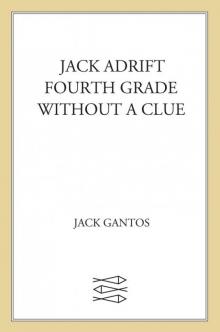 Jack Adrift
Jack Adrift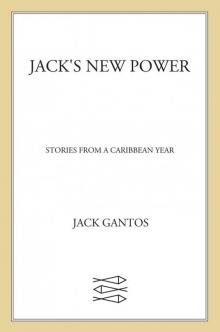 Jack's New Power
Jack's New Power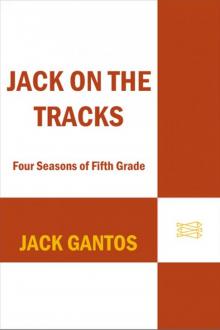 Jack on the Tracks
Jack on the Tracks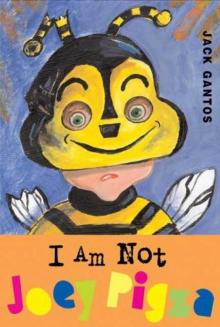 I Am Not Joey Pigza
I Am Not Joey Pigza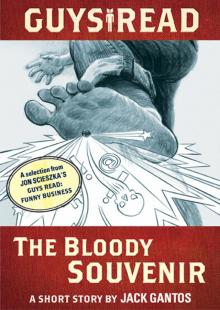 The Bloody Souvenir
The Bloody Souvenir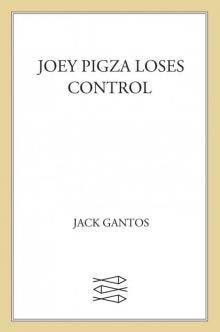 Joey Pigza Loses Control
Joey Pigza Loses Control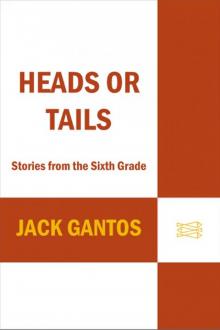 Heads or Tails
Heads or Tails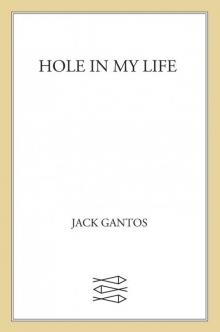 Hole in My Life
Hole in My Life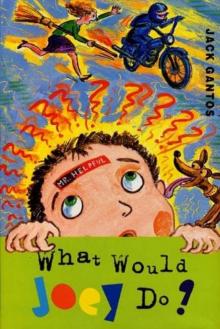 What Would Joey Do?
What Would Joey Do?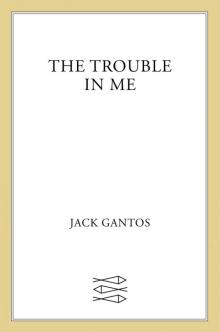 The Trouble in Me
The Trouble in Me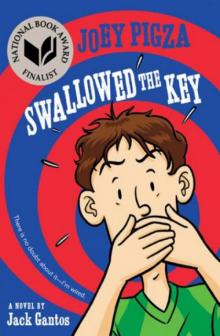 Joey Pigza Swallowed the Key
Joey Pigza Swallowed the Key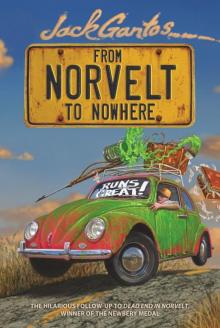 From Norvelt to Nowhere (Norvelt Series)
From Norvelt to Nowhere (Norvelt Series)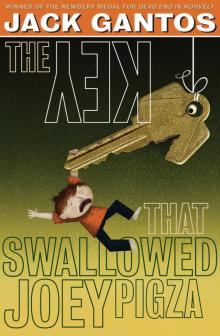 The Key That Swallowed Joey Pigza
The Key That Swallowed Joey Pigza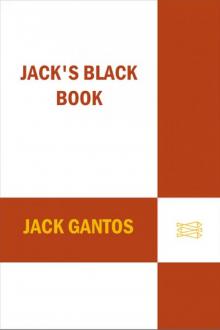 Jack's Black Book
Jack's Black Book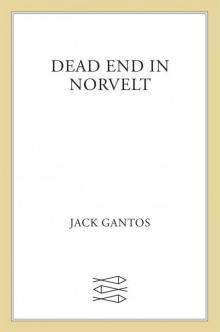 Dead End in Norvelt
Dead End in Norvelt